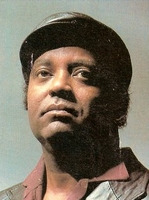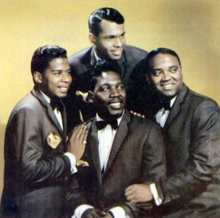| This article needs additional citations for verification. Please help improve this article by adding citations to reliable sources. Unsourced material may be challenged and removed. Find sources: "Johnny Moore" singer – news · newspapers · books · scholar · JSTOR (August 2010) (Learn how and when to remove this message) |
| Johnny Moore | |
|---|---|
 | |
| Background information | |
| Birth name | John Alfred Moore |
| Born | (1934-12-14)December 14, 1934 Selma, Alabama, United States |
| Died | December 30, 1998(1998-12-30) (aged 64) London, England |
| Genres | R&B, pop |
| Occupation | Singer |
| Instrument | Vocals |
John Alfred Moore (December 14, 1934 – December 30, 1998) was an American rhythm and blues singer with the Drifters. He was one of the group's principal lead singers, leading on many of their hit singles, and was a 1988 inductee into the Rock and Roll Hall of Fame with The Drifters.
Career

Born in Selma, Alabama, United States, Moore began as lead of the Cleveland based group the Hornets, before being discovered by the Drifters. He joined the group as lead vocalist in New York in 1955, at age 21. He was drafted into the US Army for national service; upon returning, he recorded as a soloist under the name "Johnny Darrow". He rejoined the Drifters, now with four new members, and became the lead singer in 1964, after the death of Rudy Lewis, who was due to record "Under the Boardwalk" the next day. Moore took over the lead vocals.
Subsequently, he became permanent lead. Moore had a string of hits with the group in the 1960s, most notably "Saturday Night at the Movies", "Come On Over to My Place", "At the Club" and "Up in the Streets of Harlem". He remained with the group touring the United Kingdom from early 1970 to 1998, establishing him as the group's longest-serving member.
United Kingdom
Having relocated to the UK in the early 1970s, Moore and the group scored with a string of hits, "Kissin' in the Back Row of the Movies", "There Goes My First Love", "Can I Take You Home Little Girl", "Hello Happiness" and "You're More Than a Number in My Little Red Book".
In 1982, exhausted, he left the group and then launched his own group based in London.
Death
Moore died en route to London's Mayday Hospital; the cause of death was ruled to be pneumonia. He was 64. He was survived by his wife Jennifer Moore and their three sons. Christian Moore, David Moore and John Moore Jr. Johnny Moore is also survived by his daughters Dawn M. Haley and D’Tonya Dean.
Awards and honors
- In 1988, Moore was inducted into the Rock and Roll Hall of Fame.
- Moore was given a posthumous Pioneer Award in 1999 by the Rhythm and Blues Foundation.
References
- ^ Obituary: Johnny Moore, The Independent
- ^ Scott Wilson (2016). Resting Places: The Burial Sites of More Than 14,000 Famous Persons (3rd ed.). McFarland. p. 527. ISBN 9781476625997. Retrieved 6 May 2018.
- ^ Hamilton, Andrew. The Hornets (biography) at AllMusic. Retrieved 26 October 2017.
- "Under the Boardwalk". Rolling Stone. 7 May 2012. Retrieved June 26, 2021.
the night before the session he died of a heroin overdose.
External links
- Bruce Elder. Johnny Moore (biography) at AllMusic. Retrieved 26 October 2017.
- Johnny Moore discography at Discogs
| The Drifters | |
|---|---|
| |
| Compilation albums | |
| Songs |
|
| Rock and Roll Hall of Fame – Class of 1988 | |
|---|---|
| Performers | |
| Early influences | |
| Non-performers (Ahmet Ertegun Award) | |
- 1934 births
- 1998 deaths
- American expatriates in the United Kingdom
- American rhythm and blues singers
- The Drifters members
- Atlantic Records artists
- Sue Records artists
- Singers from Alabama
- Musicians from Selma, Alabama
- Deaths from respiratory failure
- 20th-century American singers
- American tenors
- American soul singers
- Deaths from pneumonia in England
- 20th-century American male singers